- Home
- Michael Bond
Monsieur Pamplemousse on the Spot
Monsieur Pamplemousse on the Spot Read online
Monsieur Pamplemousse on the Spot
Michael Bond
CONTENTS
Title Page
1 ‘OPERATION SOUFFLÉ’
2 STRANGER IN THE NIGHT
3 A CAUSE FOR CELEBRATION
4 TAKING THE WATERS
5 L’INSTITUT DES BEAUX ARBRES
6 POMMES FRITES MAKES A DISCOVERY
7 THE PICNIC
8 A MEAL TO END ALL MEALS
9 APÉRITIFS WITH MADAME GRANTE
About the Author
By Michael Bond
Copyright
1
‘OPERATION SOUFFLÉ’
‘Pardon, Monsieur.’
Monsieur Pamplemousse jumped as a figure in evening dress suddenly materialised at his right elbow. Hastily sliding a large paperback edition of the collected works of Sir Arthur Conan Doyle beneath the folds of a snow-white tablecloth draped over his lap, he pulled himself together and in a split second made the mental leap from the austerity of number 221B Baker Street, London, Angleterre, to the unquestionably less than harsh reality of his opulent surroundings in the dining-room of Les Cinq Parfaits, Haute Savoie, France.
Inclining his head to acknowledge but not necessarily welcome the waiter’s presence, he diverted his attention with some reluctance from the adventures of Sherlock Holmes to focus on a single cream-coloured card listing the various delights of the menu gastronomique. He was all too aware as he scanned the menu that his every movement was being followed by a third pair of eyes on the other side of a large picture-window to his right and he shifted his chair in an anti-clockwise direction to avoid their unblinking gaze.
Almost immediately, following a barely perceptible signal from the maître d’hôtel, a bevy of under-waiters descended on his table, rearranged the cutlery symmetrically in front of him, rotated the plate so that the Parfait motif was in line, adjusted the vase of flowers slightly, and then drew a dark-green velvet curtain a few inches to its left, blotting out as they did so part of Lac Léman, the misty foothills of the mountains beyond, and an unseemly intruder in the foreground.
Almost as quickly as it had arrived the entourage again melted discreetly into the background, but not before a large, wet, freshly vaselined nose reappeared on the other side of the window and pressed itself firmly against a fresh area of glass.
Monsieur Pamplemousse gave a sigh. Pommes Frites was being more than a little difficult that evening. He shuddered to think what the outside of the window would be like when it caught the rays of the morning sun.
‘Pardon, Monsieur.’ The maître d’hôtel leaned across. ‘May I point out a slight change in the menu? The Soufflé Surprise is off.’
‘The Soufflé Surprise is off?’ Monsieur Pamplemousse repeated the words slowly, as if he could hardly believe his ears. ‘But that is not possible.’
To say that he had ploughed his way through six or seven previous courses with but one end in view, that of tasting the creation for which, above all, Les Cinq Parfaits was famous, would have been a gross misstatement of the facts; an unforgivable calumny. Every course had been sheer perfection; not just a plateau, but one of a series of individual peaks, each a thing of beauty in its own right, offering both satisfaction and a tantalising foretaste of other delights to come. If he stopped right where he was he could hardly complain. It had been a memorable meal. All the same, to take the mountaineering analogy still further, there was only one Everest. To have travelled so far and yet not to have scaled the highest point of all, that which was embodied in the Soufflé Surprise, would be a great disappointment.
He was tempted to ask why, if it was off, was he being shown the menu where the two words Soufflé and Surprise were printed very clearly between fromage and café. It was rubbing salt into the wound.
He glanced around the crowded restaurant. ‘There will be many sorrowful faces in Les Cinq Parfaits tonight.’
‘Oui, Monsieur.’ The waiter clearly shared his unhappiness.
‘What have you instead?’
Looking, if possible, even more ill at ease, the waiter waved towards a large trolley heading in their direction.
‘We have our collection of home-made sorbets. Monsieur may have a panaché – a selection if he so wishes.’
‘But I have already eaten a sorbet,’ said Monsieur Pamplemousse testily. ‘I had one between the Omble and the Quenelles de veau.’
And very nice it had been too – a Granité au vin de Saint Emilion, made with something rather better than a vin ordinaire if he was any judge, a Grand Cru Classé to which orange and lemon had been added, the whole garnished with a fresh, white peach inlaid with mint leaves. A palate-cleanser of the very first order. He had awarded it full marks on the pad concealed beneath a fold in his right trouser leg.
‘Fruits de saison? We have wild framboises … gathered on the mountainside just before nightfall by girls from the village. They are still warm from their aprons …’
‘Fruits de saison?’ Without raising his voice Monsieur Pamplemousse managed to imbue the words with exactly the right amount of scorn.
‘A crème caramel, Monsieur?’ There was the barest hint of desperation in the waiter’s voice. ‘Made with eggs from our own chickens, fed from the day they were born on nothing but …’
‘A crème caramel?’ Aware that he was beginning to sound like an ageing actor milking every line which came his way, Monsieur Pamplemousse decided to try another tack. ‘Have you nothing which includes the word pâtisserie?’
Even as he posed the question he knew what the answer would be. It explained the absence of many of the customary tit-bits earlier in the meal. An absence which he had noted with a certain amount of relief at the time, fearing the outcome of any battle involving mind over matter.
The waiter leaned over his table in order to remove an imaginary bread crumb. ‘I regret, Monsieur, the pâtisserie is not of a standard this evening that we in Les Cinq Parfaits would feel able to serve to our customers.’ He lowered his voice still further. ‘As for the Soufflé Surprise … pouf!’ A low whistling sound somehow reminiscent of a hot-air balloon collapsing ignominiously escaped his lips. He looked for a moment as if he were about to say something else and then decided against it, aware that he might already have spoken out of turn and betrayed a position of trust.
Monsieur Pamplemousse decided not to press the man any further. Ordering the framboises he sat back in order to consider the matter. Clearly all was not well in the kitchens of Les Cinq Parfaits, and if all was not well then it put him in something of a quandary.
His presence there was only semi-official, a kind of treat on the part of his employers, the publishers of Le Guide. It had been arranged by a grateful Director following the success of a mission on his behalf in the Loire valley. Nevertheless, implicit in the visit was an appraisal of the restaurant, an extra opinion concerning a matter which had been exercising the minds of his superiors for some considerable time. Work was never far away when food was on the table.
Just as Le Guide was by general consent the doyen of the French gastronomic guides, so Les Cinq Parfaits was considered the greatest of all French restaurants, which in most people’s eyes meant the best in all the world.
Set like a jewel in the hills east of Evian and overlooking the lake, its walls were lined with photographs of the high and mighty, the rich and famous, who in their time had made the pilgrimage to its ever open doors. Presidents came and went, royalty rose and fell, but Les Cinq Parfaits seemed set to remain where it was for ever.
In an area devoted to those whose waistlines were sadly in need of reduction, or were beyond redemption, where consequently cuisine was, generally speaking, basse rather than
haute, Les Cinq Parfaits had proved the exception to the rule and had thrived.
For many years possessor of three stars in Michelin, maximum toques in Gault Millau, and one of less than a dozen restaurants in France to enjoy the supreme accolade of three Stock Pots in Le Guide, it was an open secret that it was only a matter of time before one of the three rival guides broke ranks and awarded Les Cinq Parfaits an extra distinction of some kind.
Therein lay the rub. Such a break with tradition, were it to backfire, would lay whoever was responsible open to all manner of criticism. On the other hand, to delay, to be second, would be to risk the accusation of being a follower rather than a leader. It was a knotty problem and no mistake.
If three Stock Pots represented perfection, then a fourth would need to stand for something even more absolute. On the showing that evening, one of the cinq Parfaits, either Monsieur Albert, the father, or one of his four sons, Alain, Edouard, Gilbert or Jean-Claude, was failing to live up to the family name.
Monsieur Pamplemousse glanced around the room. Like all restaurants of its class, staff seemed to outnumber the diners. His notes and reference cards upstairs would give him the exact answer, but he judged the capacity to be about sixty couverts. All the tables were full, many of them would have been booked weeks if not months ahead; the clientèle was international. Waiters switched from speaking French to German to English and back again with practised ease.
The ceremony of the lifting of the silver salvers was in full swing. No dish arrived in the dining-room uncovered. No matter how many guests were seated round a table, for the waiter to ask who had ordered what was regarded as a cardinal sin, and the lifting of all the covers in unison was a theatrical gesture which never failed to draw the gastronomical equivalent of a round of applause.
At the next table a waiter who had just finished translating the entire menu into perfect German was now performing the same feat in English for another family. From the snatches of conversation he’d overheard when they arrived he gathered the daughter was at a local finishing school. Clearly her parents were not getting value for money.
Beyond them, at a smaller table, a young girl was sitting alone. From her blonde hair and the colour of her skin, and the fact that she seemed to be on nodding terms with the family at the next table, he guessed she must be English too. Probably at the same finishing school as their daughter. She couldn’t have been more than eighteen or nineteen.
He wondered what she was doing there. She seemed oddly out of place and ill at ease, rather as if she was waiting for someone who she knew was going to let her down. Irrationally he found himself wanting to go across and ask if he could help in any way, but he resisted for fear his action might be misinterpreted, as it certainly would be by the other diners, if not by the girl herself. People always thought the worst. Once or twice she looked up quickly and caught him watching her, then just as quickly she looked down again, colouring in a becoming manner.
Holmes would have known all about her by now. He would have built up a complete picture in his mind, picking up some detail to do with the way she wore her belt or the cut and style of her dress.
‘Borrowed for the evening, my dear Watson. And in a hurry too. You can tell by the way it doesn’t quite match her nail-varnish.’
With difficulty he disengaged himself from the scene in order to return to his book. Reading it was really a labour of love; a holiday task he had set himself – a chance to improve his English while at the same time meeting up again with one of his favourite characters.
The stories were as unlike his own experiences in the Paris Sûreté as it was possible to imagine, and yet there was a certain fascination about them that he found irresistible. The particular story he was reading – The Hound of the Baskervilles – was a case in point. He had barely reached the second page when Holmes, from a brief examination of a man’s walking-stick, had deduced that the owner was a country doctor who had trained at a large London hospital, left when he was little more than a senior student, was still under thirty years of age, amiable, absent-minded, and the possessor of a favourite dog, larger than a terrier and smaller than a mastiff.
Rereading the passage reminded Monsieur Pamplemousse of Pommes Frites. He looked round, but the face was no longer pressed against the window. It didn’t need the intellectual powers of a Sherlock Holmes to tell him that his own particular Watson had gone off in a huff, and even though Pommes Frites’ exclusion from the meal had not been of his choosing he felt a sudden pricking of his conscience.
The discovery when they arrived at Les Cinq Parfaits that dogs were interdits had been a bitter disappointment. The ban had been imposed after a visiting captain of industry had been set upon one evening by a Dobermann Pinscher belonging to a disgruntled shareholder. It was understandable up to a point, but it was like forbidding visitors to the Eiffel Tower because someone had once been caught trying to place a bomb underneath it; hard to accept and impossible to explain to a creature whose powers of reasoning didn’t follow such convoluted paths.
Not that the four-legged visitors to Les Cinq Parfaits did badly for themselves. The kennel area behind the main building was a model of its kind, the service was impeccable, with staffing levels scarcely less than in the restaurant itself. The straw was changed twice daily and there was a choice of food which was served from china plates bearing the hotel crest. Had there been paw-operated bell-pushes Monsieur Pamplemousse wouldn’t have been surprised. At fifty francs a day, full pension, service compris, it was incredibly good value.
All the same, it wasn’t like sharing a table, and in the event Pommes Frites had taken the whole thing rather badly, just as Monsieur Pamplemousse had feared.
Pommes Frites had a simplistic approach to life. Black, to him, was black. White was white. The shortest distance between two points was a straight line, and restaurants were for eating in, regardless of race, colour or breed. Rules of entry which showed any form of discrimination were beyond his comprehension.
Equally, Monsieur Pamplemousse had to admit that he missed Pommes Frites’ company. Not just the occasional warmth of a head resting on his shoe, or the nuzzling up of a body against his leg, but also his views on the food, often conveyed by the raising of an eyebrow or a discreet wag of his tail.
Pommes Frites had a bloodhound’s sensitivity to smells and to taste, a sensitivity sharpened by his early training with the Paris police and honed finer still during travels with his master over the length and breadth of France. Had they but known it, there were many restaurants who owed their placing in Le Guide to Pommes Frites’ taste-buds, and Monsieur Pamplemousse would have given a great deal to have noted down his reaction to the meal he had just eaten.
He gazed out of the window at the lights of Lausanne, twinkling on the Swiss side of the lake. Somewhere in-between a steamer slowly made its way back to Geneva. He looked at his watch. It was still barely ten o’clock. He had dined early. There would be time for a stroll before retiring to bed. Perhaps he could take Pommes Frites for an extra long walk that night to help make up for things. There were some emergency biscuits in the boot of the car. When they got back he would open the packet as a special treat.
He glanced up again as a waiter came towards him carrying a silver tray bearing not, as he might have expected, a dish containing a mound of wild raspberries, but a plate on which reposed a single light-blue envelope. He frowned, recognising the colour of the hotel stationery. Who could possibly be sending him a note?
As the waiter disappeared again he picked up a knife and slit open the envelope, aware that the party at the next table was watching him curiously. Inside there was a sheet of white telex paper and underneath a duplicate in pink. The message was short and to the point; a single word in fact. The word was ESTRAGON.
To say that Monsieur Pamplemousse blanched visibly as he digested it would have been to cast aspersions both on his ability to conceal his true feelings and on the subdued and subtle lighting conceived by the architect r
esponsible for the interior design of the restaurant. Bearing in mind the sometimes astronomical size of the bills, blanching of any kind was filtered out by rays which purposely emanated from the warmer end of the spectrum.
Nevertheless, he felt a quickening of his pulse as he carefully refolded the message and slipped it between the pages of his book to mark where he had left off. Any further reading was out of the question. Had he been Sherlock Holmes he would probably have reached for his violin in the hope of applying the panacea of music to soothe his racing thoughts. Instead, Monsieur Pamplemousse did the next best thing; he picked up a spoon and fork. More waiters were heading in his direction. It would be a pity to let the efforts of all those village girls with their bulging aprons go to waste.
The framboises were beyond reproach. He added a little more cream.
The word ESTRAGON meant only one thing. There must be an emergency of some kind.
It couldn’t be anything personal. He’d telephoned Doucette just before dinner. She’d been in the middle of her favourite serial and he’d had to do battle against background music from the television. In any case, if it was something personal surely the telephone would have sufficed.
In all his time with Le Guide the use of the emergency codeword had been minimal. The last occasion he could recall had been all of two years ago when Truffert from Normandy had been caught reading a copy of L’Escargot, Le Guide’s staff magazine, while reporting on a restaurant in Nice. There had been hell to pay. Anonymity was a sacred rule, never to be broken. Heads had rolled.
But then its use had been in reverse; a call to Headquarters from someone in the field. He couldn’t recall a time when the word had gone out from Headquarters itself. He wondered if it was a general alarm. Perhaps all over France colleagues were waiting for their café as he was and wondering.
The first cup came and went. Declining a second, he rose and made his way towards the door. As he did so he caught the eye of the blonde girl. She blushed and looked down at her plate as if conscious that he’d singled her out for attention.

 Paddington on Top
Paddington on Top Paddington Takes the Test
Paddington Takes the Test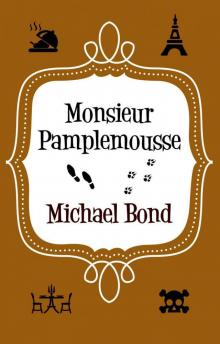 Monsieur Pamplemousse (Monsieur Pamplemousse Series)
Monsieur Pamplemousse (Monsieur Pamplemousse Series) Paddington Here and Now
Paddington Here and Now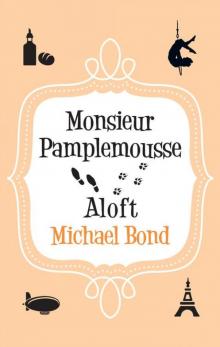 Monsieur Pamplemousse Aloft
Monsieur Pamplemousse Aloft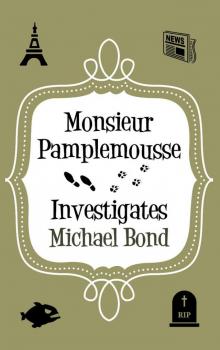 Monsieur Pamplemousse Investigates
Monsieur Pamplemousse Investigates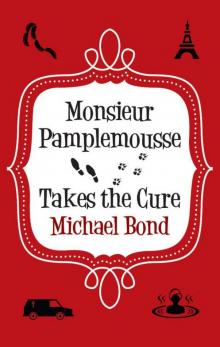 Monsieur Pamplemousse Takes the Cure
Monsieur Pamplemousse Takes the Cure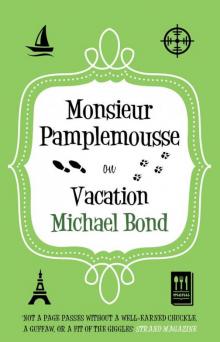 Monsieur Pamplemousse on Vacation
Monsieur Pamplemousse on Vacation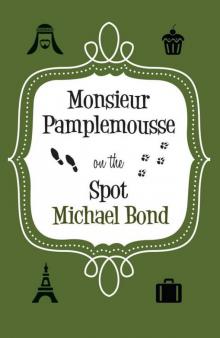 Monsieur Pamplemousse on the Spot
Monsieur Pamplemousse on the Spot Monsieur Pamplemousse Hits the Headlines
Monsieur Pamplemousse Hits the Headlines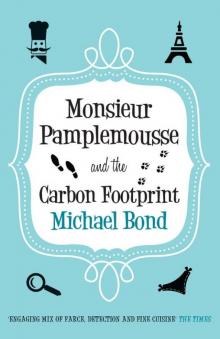 Monsieur Pamplemousse and the Carbon Footprint
Monsieur Pamplemousse and the Carbon Footprint Love from Paddington
Love from Paddington Paddington’s Finest Hour
Paddington’s Finest Hour Paddington Complete Novels
Paddington Complete Novels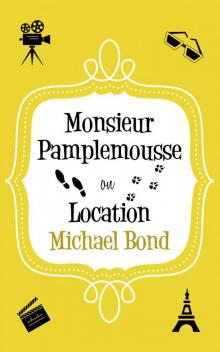 Monsieur Pamplemousse On Location
Monsieur Pamplemousse On Location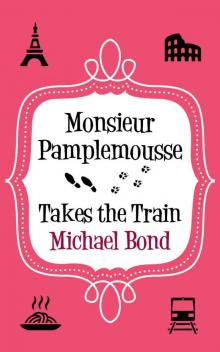 Monsieur Pamplemousse Takes the Train
Monsieur Pamplemousse Takes the Train It Wasn’t Me!
It Wasn’t Me! Paddington Races Ahead
Paddington Races Ahead Monsieur Pamplemousse and the Tangled Web
Monsieur Pamplemousse and the Tangled Web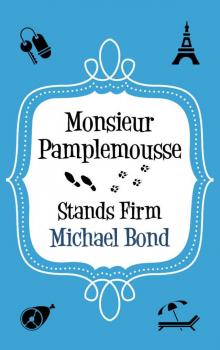 Monsieur Pamplemousse Stands Firm
Monsieur Pamplemousse Stands Firm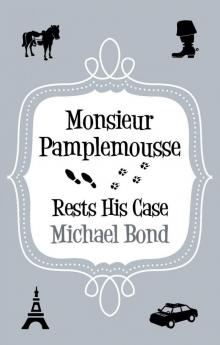 Monsieur Pamplemousse Rests His Case
Monsieur Pamplemousse Rests His Case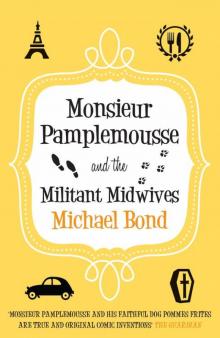 Monsieur Pamplemousse and the Militant Midwives
Monsieur Pamplemousse and the Militant Midwives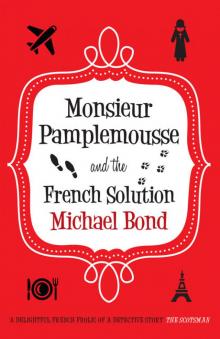 Monsieur Pamplemousse and the French Solution
Monsieur Pamplemousse and the French Solution Paddington Helps Out
Paddington Helps Out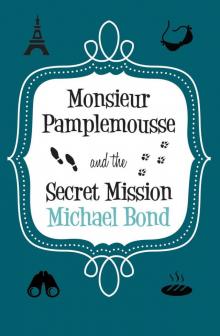 Monsieur Pamplemousse & the Secret Mission (Monsieur Pamplemousse Series)
Monsieur Pamplemousse & the Secret Mission (Monsieur Pamplemousse Series)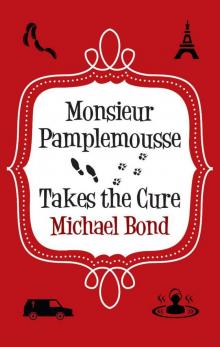 Monsieur Pamplemousse Takes the Cure (Monsieur Pamplemousse Series)
Monsieur Pamplemousse Takes the Cure (Monsieur Pamplemousse Series) A Bear Called Paddington
A Bear Called Paddington